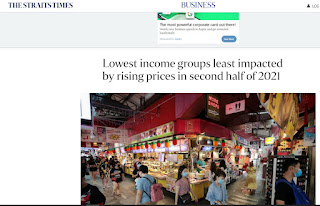Lucky
Luciano, who is considered to be the father of modern organized crime, was
reputed to have said that if he had to do it all over again, he would “do it
legal.” He said, “"I learned too late that you need just as good a
brain to make a crooked million as an honest million.”
I think this line at a time when the hot topic in Singapore
is “scams.” Banks have suddenly discovered that cyberspace is filled with scam
artist and they have been forced to “warn” customers about the reality of being
scammed online:
Scams are officially sexy. If you want to start a discussion on anything outside Covid-19, talk about scams. Crime has always been a sexy talking point and why shouldn’t a scam that robs a young couple of their funds for a dream home or an old lady of her pension be a talking point?
While its fun to talk about scams and crimes in general
produces grab headlines, the real money, as Mr. Luciano alluded to, is in the legitimate.
Why break the law and risk the punishments that come with it when you can work within
the law? There are ways of doing things which may sound questionable but are in
fact perfectly legal.
Singapore is rich in examples of how people make money from doing
things legitimately. If you look at the top, we have the example of our
politicians, whom unlike most of their Asian counterparts, are known for NOT
taking bribes.
There’s a reason for this. Our politicians are the world’s
best paid and we are reminded that we need to pay politicians exceedingly well to
ensure that there’s no incentive to use their positions of power to dip into the
public purse. Our politicians are placed in a situation of “Why steal when you can
get an exceedingly good life legally?”
When Singaporeans complain about politicians, it’s always
about whether they are getting the value for what they’re paying rather than
where any given politician gets their money from. Our Prime Minister is the world’s
highest paid but unlike his former counterpart across the Causeway, he does not
have to explain how he got a “donation” into his personal bank account.
Just as our politicians are in position where they have “no
incentive to be corrupt,” our banks are placed in a position where they have “no
incentive to be reckless” with their funds. Just as you will never have to
bribe a politician in Singapore, you will never get a “subprime” situation out of
Singapore’s banks.
Singapore is a wonderful market for banks to be in. Look the
basics of what a bank does (borrow money cheaply and lend it out at significantly
higher rates). Our banks offer some of the lowest interest rates around. The standard
interest rate on a fixed deposit is less than one percent per year.
https://blog.moneysmart.sg/fixed-deposits/best-fixed-deposit-accounts-singapore/
On the other hand, the banks are position of lending at much
higher rates. Home loans, which the most secure loans for banks hover around
one percent per year and there are credit cards, which allow banks to charge up
to 25 percent a year.
https://www.finder.com/sg/credit-cards/credit-card-interest-rates
You would imagine that the difference in what they pay to
people they borrow from and what they get paid by the people they lend to would
be the only license to print money. Well, it isn’t. One of the great money
spinners for banks is “fees,” particularly “fall below” fees.
A fall below fee is essentially a fee charged for having
less than a certain amount in your account. The amount can vary from as little
as $2 a month for having less than $500 in your DBS savings account to as much
as S$35 a month for having less than $10,000 a month in the business accounts
offered by most banks.
The banks have ingeniously argued that it is necessary for them to charge fall below fees because customers might set up dormant accounts and having less than a certain amount in a bank account costs the bank money (let’s remember that the main inventory stored in a bank account is money, which for the most part exists as computer code, in the bank’s system).
It goes without saving that the people who provide a good
portion of the bank’s fees tend to be the less well to do. A person earning
S$1,400 a month (the amount most people consider the minimal for survival) is less
likely to be able to keep the $500 minimum sum in his or her account at the end
of the month than say someone earning S$5,000 and above. Hence, the person
earning less is more likely to have to pay the monthly S$2 surcharge that DBS/POSB
imposes. The same goes for enterprises. An entrepreneur starting out will need
to factor an additional $35 a month in bank charges as a business expenses
whereas an established government linked company does not have to. Reasons is
simple, a government linked company will at any given time have more than S$10,000
in the bank than a “boot-strapping” entrepreneur.
Now, if you follow the argument as to why banks need to
charge a “fall-below” fee, the immediate question is why don’t the banks hive
off the customers to someone else. Budget airlines started by taking over the
routes that were “unprofitable” for national carrier. It’s also been done in
places like China, where “FinTech” firms compete with the banks. Firms like Ant
Financial (Alipay) and Tencent (WeChat pay) have developed sophisticated
payment systems that by pass the banks. It’s reached a stage where even the beggars
(not exactly the people banks try to get as customers) offer you a QR code.
That’s not going to happen in Singapore. As much as the
government talks about “inclusiveness” in the banking sector and inviting “Fintech”
firms into the market, the ecosystem in Singapore is “Bank-centric.” Everything
has to start and end with a bank account. In China, I don’t have to deal with
the Chinese banks. I merely do as the Chinese beggars do – I get an account
with Alipay or WeChat. By comparison, I need to have a bank account, even if
the only payment system I’ll ever use is “PayNow.” The system is designed in
such a way where the FinTechs can only exists as subcontractors to the banks
rather than as competitors. This situation is best described by Mr. Emanuel
Daniel, Founder of the Asian Banker:
https://www.emmanueldaniel.com/why-dbs-is-not-the-worlds-best-bank/
Sure, the banks haven’t wiped out large sums of money like
the crooks behind the recent phishing scams. However, their ability to charge “fall-below”
fees eats away at the savings of those at the bottom of the pile (S$2 a month
might not seem like a lot but it adds up). More Importantly, what they’re doing
is perfectly legal and their ability to continue doing this is blessed by the
government.
The wisdom of Mr Luciano cannot be disputed. Sure, the guys
doing the phishing are making the headlines but the guys really making the
money are the banks. Instead of trying to break the law, we should always get
the law to work for us instead.






















